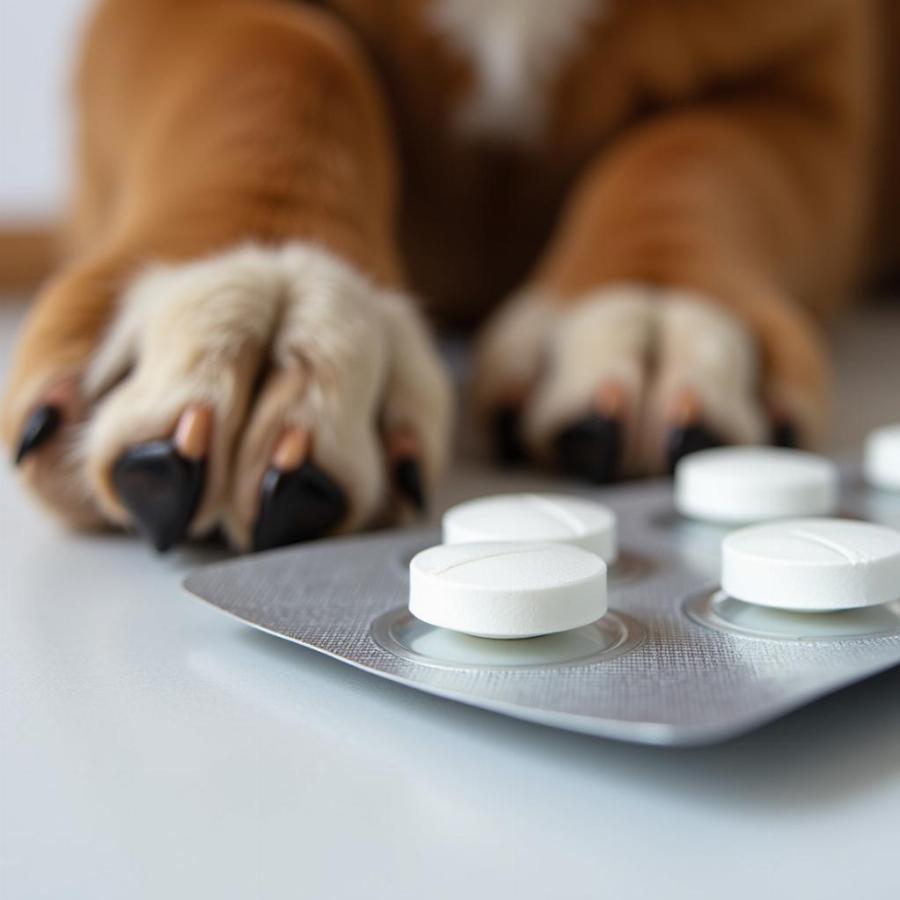Claritin (loratadine) can be a helpful medication for dogs suffering from allergies, but determining the correct claritin dosage for dogs by weight is crucial. Administering the wrong dose can be ineffective or even harmful. This comprehensive guide will explore the safe and effective use of Claritin for dogs, focusing on proper dosage based on weight, potential side effects, and when to consult a veterinarian.
Understanding Claritin for Dogs
Claritin, a common over-the-counter antihistamine for humans, can also provide relief for dogs experiencing allergy symptoms like itching, sneezing, and watery eyes. It works by blocking histamine receptors, reducing the allergic reaction. However, not all forms of Claritin are safe for dogs. Only use plain loratadine tablets. Formulations containing decongestants like pseudoephedrine or phenylephrine can be toxic to dogs.
 Claritin Tablets for Dogs
Claritin Tablets for Dogs
Calculating the Correct Claritin Dosage for Dogs by Weight
The general guideline for Claritin dosage in dogs is 0.2mg per pound of body weight. This means a 10-pound dog would receive 2mg of loratadine, while a 50-pound dog would receive 10mg. However, it’s always best to consult with your veterinarian before giving your dog any medication, even over-the-counter ones. They can assess your dog’s individual needs and determine the most appropriate dosage. Never exceed the recommended dosage without veterinary guidance.
Claritin Dosage Chart for Dogs (General Guideline – Consult Your Vet)
| Weight (lbs) | Claritin Dosage (mg) |
|---|---|
| 10 | 2 |
| 20 | 4 |
| 30 | 6 |
| 40 | 8 |
| 50 | 10 |
| 60 | 12 |
| 70 | 14 |
Potential Side Effects of Claritin in Dogs
While generally safe, Claritin can cause some side effects in dogs, including:
- Dry mouth
- Drowsiness
- Increased heart rate
- Urinary retention
If you observe any of these side effects, contact your veterinarian. Severe reactions are rare but require immediate veterinary attention.
When to Consult a Veterinarian
While Claritin can be helpful for managing mild allergy symptoms, it’s important to consult your veterinarian before administering it to your dog, especially if your dog has any underlying health conditions. They can determine if Claritin is the right choice and advise on the correct dosage and frequency. can dogs take loratadine discusses this in more detail.
What if my dog eats more than the recommended dose?
If your dog accidentally ingests more than the recommended dose of Claritin, contact your veterinarian or an animal poison control center immediately.
Can I give my dog Claritin-D?
No, never give your dog Claritin-D. This formulation contains pseudoephedrine, which is toxic to dogs. zyrtec for dogs dose offers information on another antihistamine option for dogs.
Is Claritin safe for long-term use in dogs?
Your veterinarian can determine if long-term use of Claritin is appropriate for your dog’s specific needs. is claritin ok for dogs can provide additional information on this topic.
Conclusion
Claritin can be a useful tool in managing your dog’s allergies, but proper dosage based on weight is essential for safety and effectiveness. Always consult your veterinarian before giving your dog any medication, and carefully monitor for any potential side effects. Remember, zyrtec dosage for dogs by weight is another resource you can explore for alternative antihistamine options.
FAQ
- Can I give my dog Claritin every day? Consult your veterinarian to determine the appropriate frequency for your dog’s needs.
- What are the signs of an allergic reaction in dogs? Common signs include itching, sneezing, watery eyes, and skin redness.
- What should I do if my dog experiences side effects from Claritin? Contact your veterinarian immediately.
- Are there any alternatives to Claritin for dog allergies? Yes, other antihistamines like Zyrtec can be used in dogs under veterinary guidance.
- Can I crush Claritin tablets and mix them with my dog’s food? Yes, you can crush the tablet and mix it with a small amount of food.
- What are the different types of allergies dogs can have? Dogs can have environmental allergies (pollen, dust mites), food allergies, and flea allergies.
- How can I prevent my dog’s allergies from flaring up? Minimizing exposure to allergens, regular bathing, and a healthy diet can help.
Beaut Dogs is your trusted source for comprehensive and expert information on all aspects of dog ownership. From breed selection to health care and training, we provide valuable resources to help you give your furry friend the best possible life. For personalized advice and support, contact us at Email: suport@beautdogs.com. Beaut Dogs is dedicated to providing accurate and up-to-date information for dog lovers everywhere. Visit us at https://beautdogs.com.